Jeff Cisneros, founder and CEO of the Sparta Combat League, watches the fights from cage-side.
Fight promoters don’t always have the best reputation. Most people think (and often justifiably so) that the main objective of any promotional entity is to generate profits by any means possible, even if that comes at the expense of fighters, trainers or in some cases, the public. But a lifelong entrepreneur turned fight promoter is out to change that perception, and he’s doing it by giving back.
Videos by VICE
Jeff Cisneros is the founder and CEO of the Sparta Combat League (SCL), a Colorado-based fight promotion that officially launched in 2012, operating a few years beforehand under the name Beatdown Promotions. The unique thing about SCL is that every fight card has a charitable cause behind it where money is collected from the crowd during the night, and then donated to families affected by financial burden. By chance circumstances, I’m invited to cover their annual “AVM – Fight for Our Troops” event at the Xfinity Arena in Everett, Washington. The evening’s activities were in honor of the men and women who serve the country’s armed forces.
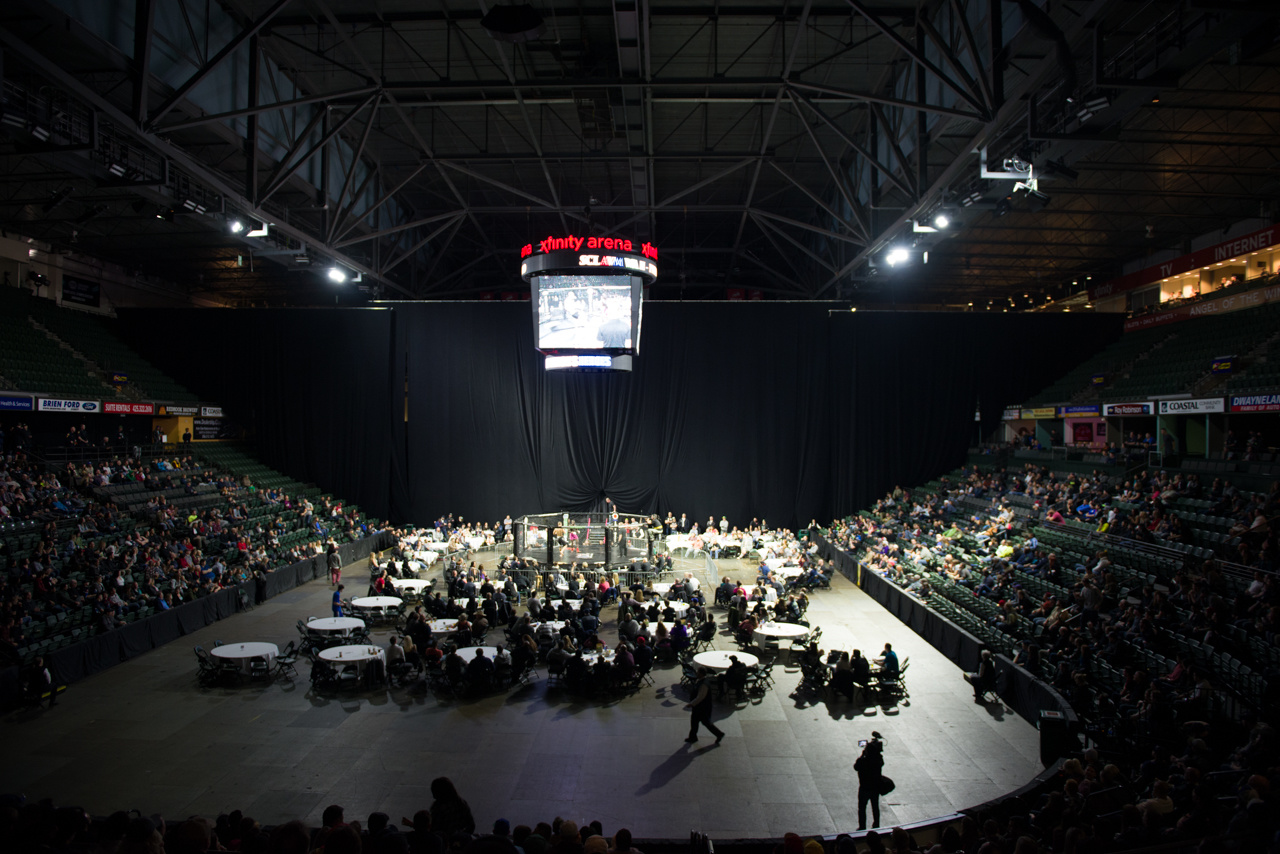
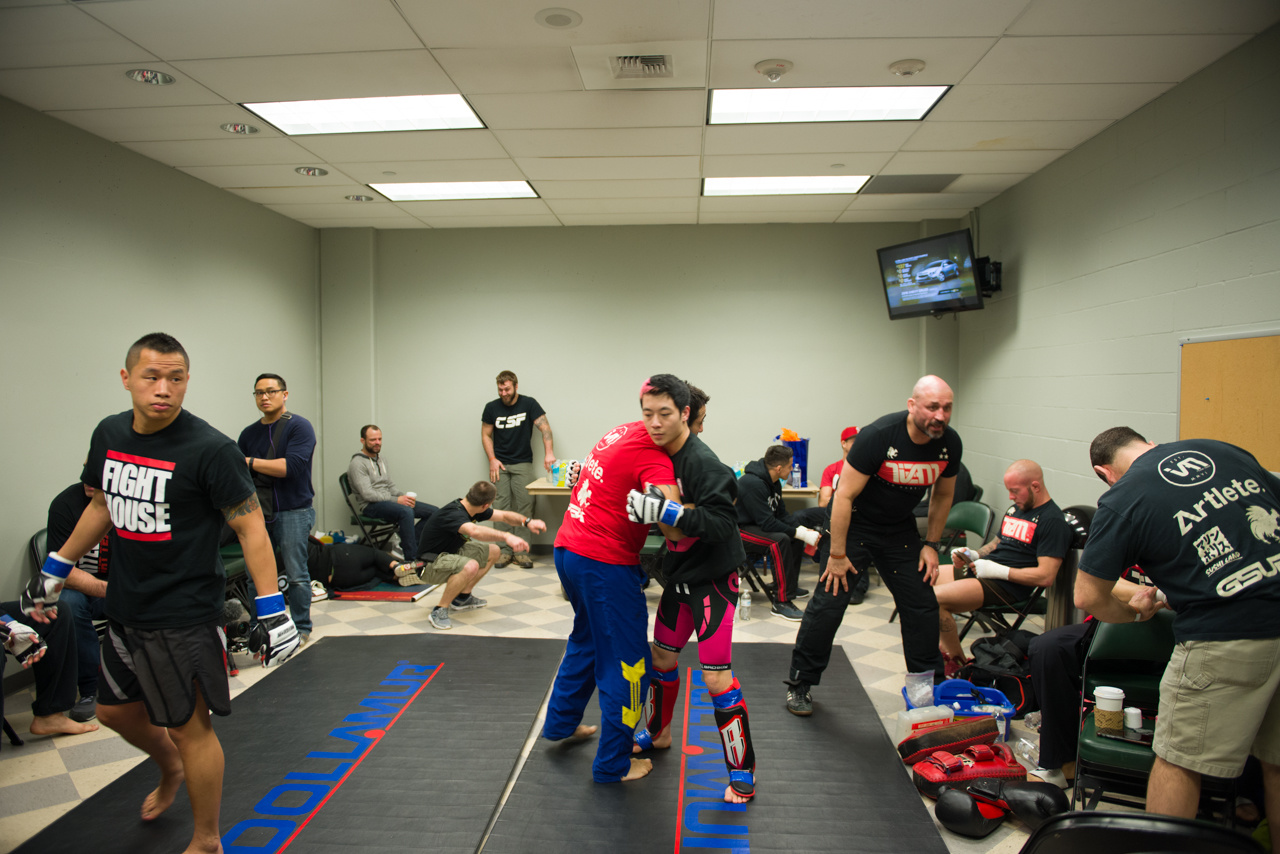
“One hundred percent of whatever we raise that night goes straight to the families before they even leave the event center,” says Cisneros. “What’s great about it is that we have sponsors that want to come up and meet the cause, and they can write the check directly to the family. There’s no 501(c) involved. There are no extra fees taken out. The family walks away with every dime that is raised that night.”
I wonder if there’s a subtle coincidence in the company name since Cisneros has a strange resemblance to King Leonidas from the movie 300. He also appears to have an uncanny ability to remember names as he recounts all the major influences in starting up the venture, even if the memory is over half-a-decade old. Names such as Dusky Vanness, a staff sergeant who offered support from the US Army after Sparta’s first event, Dean Sanchez of the Wounded Marine Corp Regiment of Denver who helped find the featured military families in need, and of course Danny Dietz, the famed Navy Seal who had a movie made about his life in 2011, and was one of the first honorees of a Sparta event. Though there are names that Cisneros may have forgotten, he remembers the impression they left, such as one wounded veteran, who after being comped as a special guest to a Sparta event, sent Cisneros a three-page text message the next day, detailing how the experience had saved his life. It was then that Cisneros realized that he had something, not only as a business venture, but also as a service to the community.
“We’re dealing with 22 suicides a day that are military related,” says Cisneros. “That’s unacceptable. A big part of that is because they don’t think they have any help.”
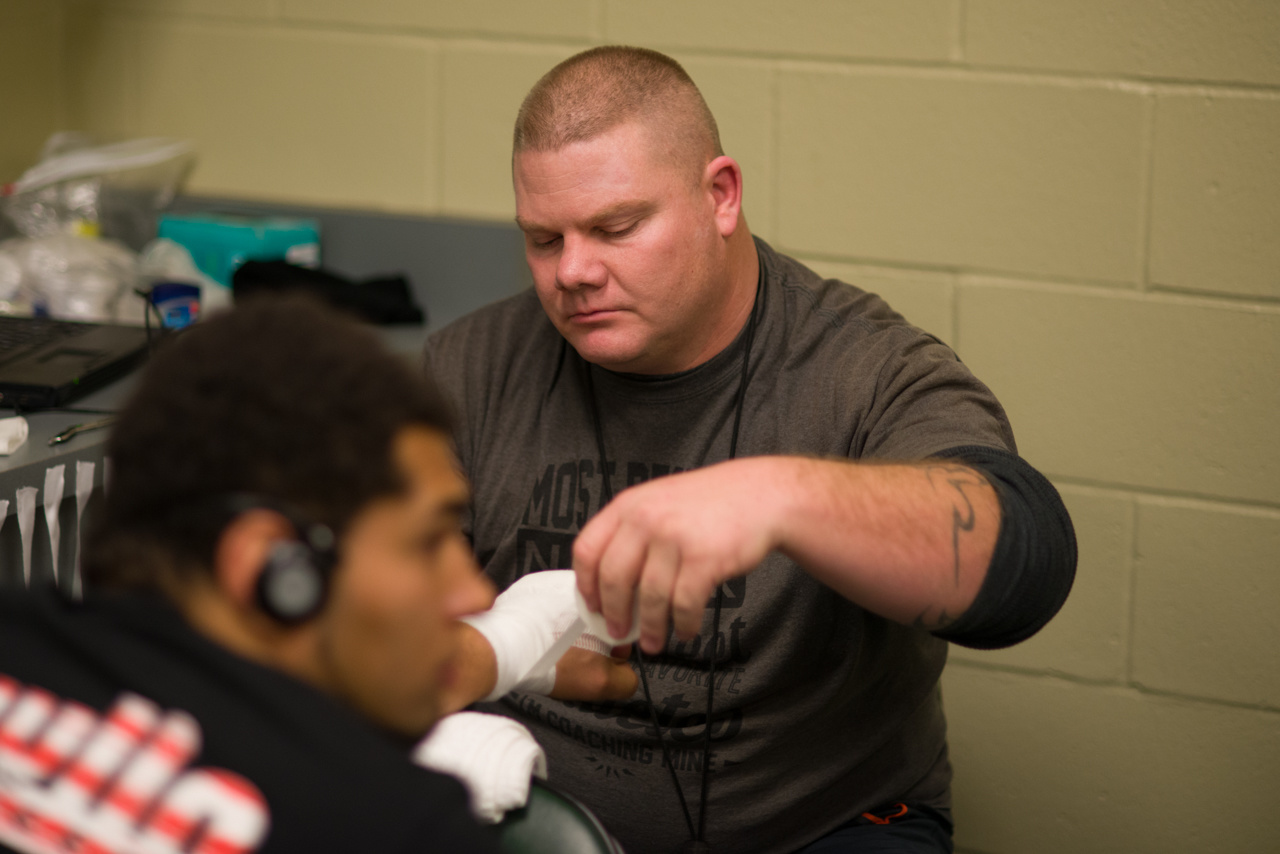
Sparta matchmaker Vern Earwood wraps the hands of the co-main event. Earwood is an ex-fighter and ex-war vet turned fight trainer. He says the experience working with Sparta and combat sports saved his life.
And the events don’t only benefit veterans. Anything from cancer, autism, suicide prevention, or as Cisneros simply puts it, “families just going through a tough time”, can be the featured cause of a Sparta event. One such case is that of Kathleen Santistevan, mother to a 9-year-old boy who was diagnosed with stage-four brain cancer that eventually spread to his spine. She learned about Sparta’s charitable mission through a friend and sent an email detailing her story. The next day Cisneros showed up at the hospital to meet her son Gabriel, and inform the family that they would be featured as the honorees at the next event. For Santistevan, the fight affair was a touching experience.
“So we get to the fights and during intermission [Jeff] brought Gabriel up and made him feel like a person,” Santistevan tells me. “[Sparta] is an amazing company. The people have the biggest hearts. They make you feel special. Jeff would come to visit Gabe everyday or every other day, and it wasn’t just him. It was him and his wife and the rest of the group. The fighters and everybody would be like ‘Hey man!‘ [to Gabe at the fights].
“[Before the event] I thought [MMA] was a crazy sport with a lot of fighting and blood, but [the event] showed me how real these fighters are, how strong they are and how big of a heart they have. I realized that these are not just fighters, these are real people.”
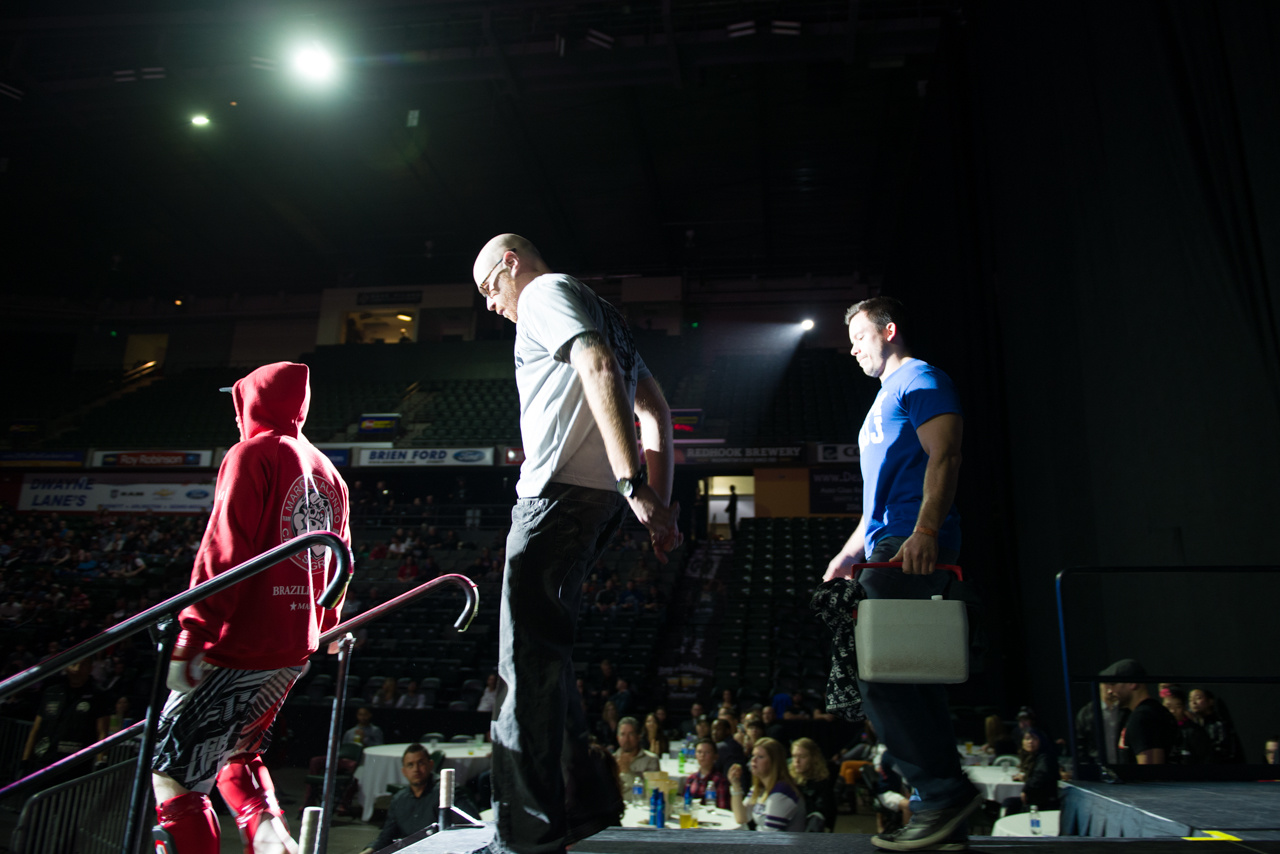
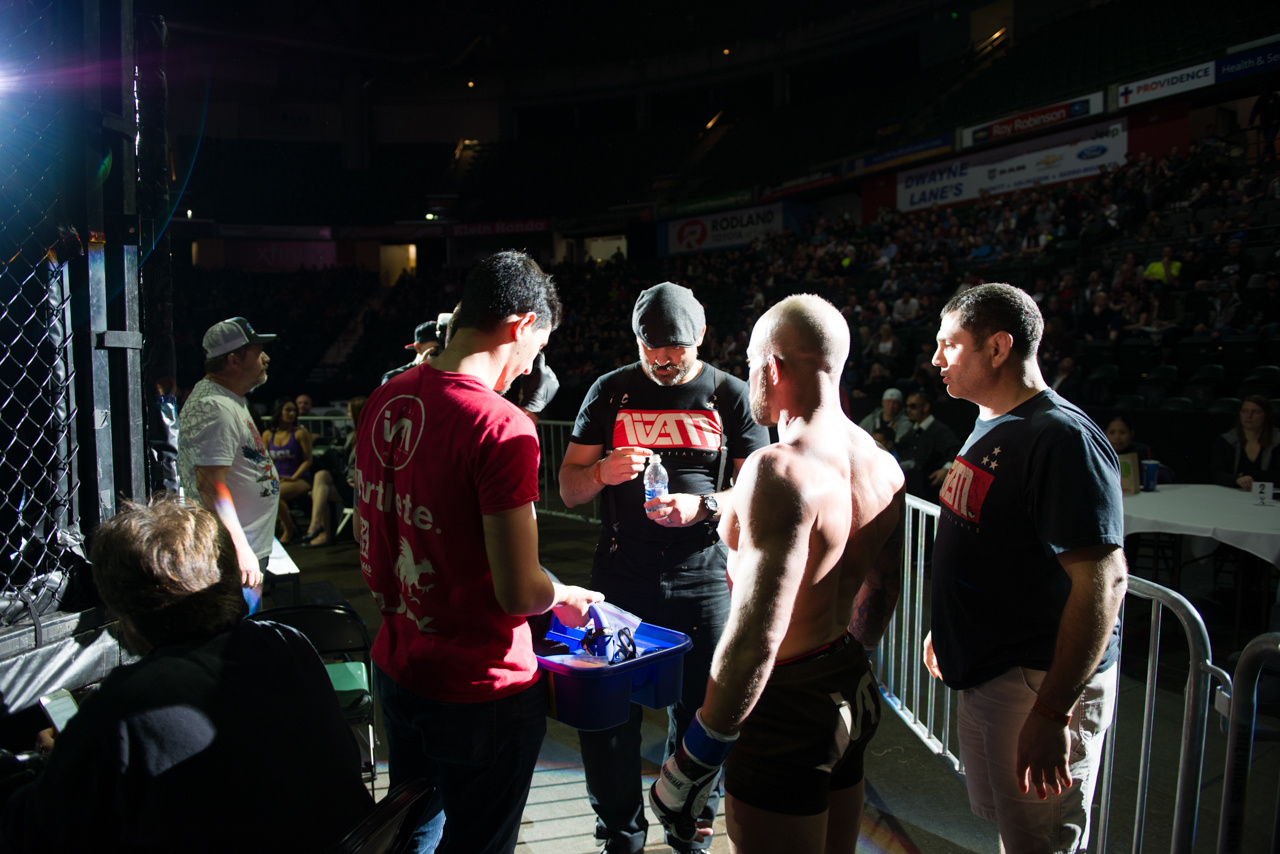
In total, Sparta was able to raise roughly $5,000 for the Santistevan family, a sum that helped significantly during a rough patch in their lives.
“At the time my son was probably a couple months into radiation and chemo, and I was on FMLA [The Family and Medical Leave Act] and had to take a leave of absence,” Santistevan tells me. “On top of the stress of wondering if my son was going to survive the cancer, I had to worry about bills, how my mortgage was going to be paid, how my daughter was going to be taken care of and you know, not lose everything we had. I was just worried and didn’t know what to do. I didn’t know that there were people out there that cared so much.”
Gabriel is now 12-years-old and despite still battling his diagnosis, has since stabilized his condition. He is also one of Sparta’s biggest supporters, left with long-lasting impressions from the night he was honored. Other event recipients have had similar experiences.
“It’s brought a lot of hope to the boys. I mean they watch these guys get in there and give it their all and get knocked out and get back up. The one thing about Jeff and SCL is that it’s really a family environment,” says Suzanne Leypoldt, mother to three sons who suffer from FAHRs disease, a rare neurological disorder that calcifies the brain and degenerates motor and cognitive functions over time. There are only about 90 known cases in the world, and all three of Leypoldt’s sons have been diagnosed with the condition.
Like the Santistevan family, the Leypoldts also heard of Sparta through family, friends, or friends-of-friends. That is probably one of the more interesting things as to how event recipients are found. There is no online casting call, no excessive adverts broadcast to the public; news is passed through word-of-mouth from everyday community members looking out for one another, and by highlighting the cause on a public forum, the benefits go beyond the donations itself.
“For them it’s more of getting the exposure out there cuz we don’t know if there’s another family that has [FAHRs] and could help them. We don’t know if there’s a doctor watching that could help them,” says Cisneros.
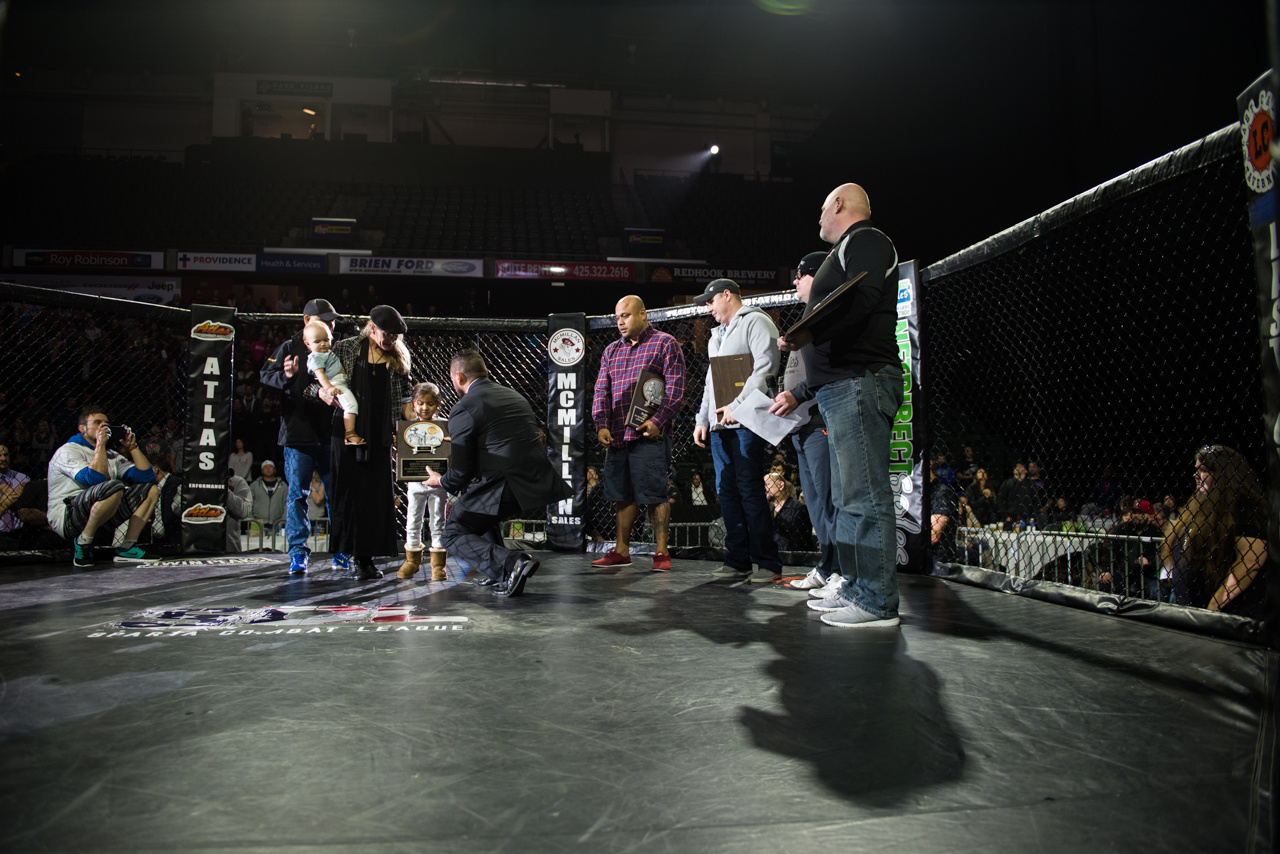
During intermission, Cisneros presents honorary plaques to wounded war vets and the family members of soldiers who never returned home.
At AVM, I witness one of the ceremonies for myself. During the intermission, Cisneros stands in the center of the cage to present plaques honoring a number of war vets and their families for their service. Three men recovering from battle wounds hobble into cage, followed by a woman carrying two children. She’s being honored because her eldest son never came back home. Afterwards in the back room, I approach one of the men I saw in the cage, pegging him as one of the honored war vets of the evening. It turns out that he was just helping out with the proceedings, but the assumption isn’t too far off.
“Well for me personally, [fighting] probably saved my life,” says Vern Earwood, one of the Colorado matchmakers for SCL. Earwood is also an ex-combat vet, an ex-fighter, and coaching the co-main event of the evening. “I grew up boxing when I was a kid, joined the Marine Corp – service six years – and after I got out, like a lot of veterans, I drank a lot. I did a lot of things I shouldn’t have. I went down on an unstable road and then mixed-martial-arts kind of brought me back from that. It gave me a sense of direction, as far as what I wanted to do and still put me in a position to help better myself, improve what’s going on in my life as well as those around me. Now I’m more of a coach and it’s benefitted me to put me back in a position to try and help other young men and young women.”
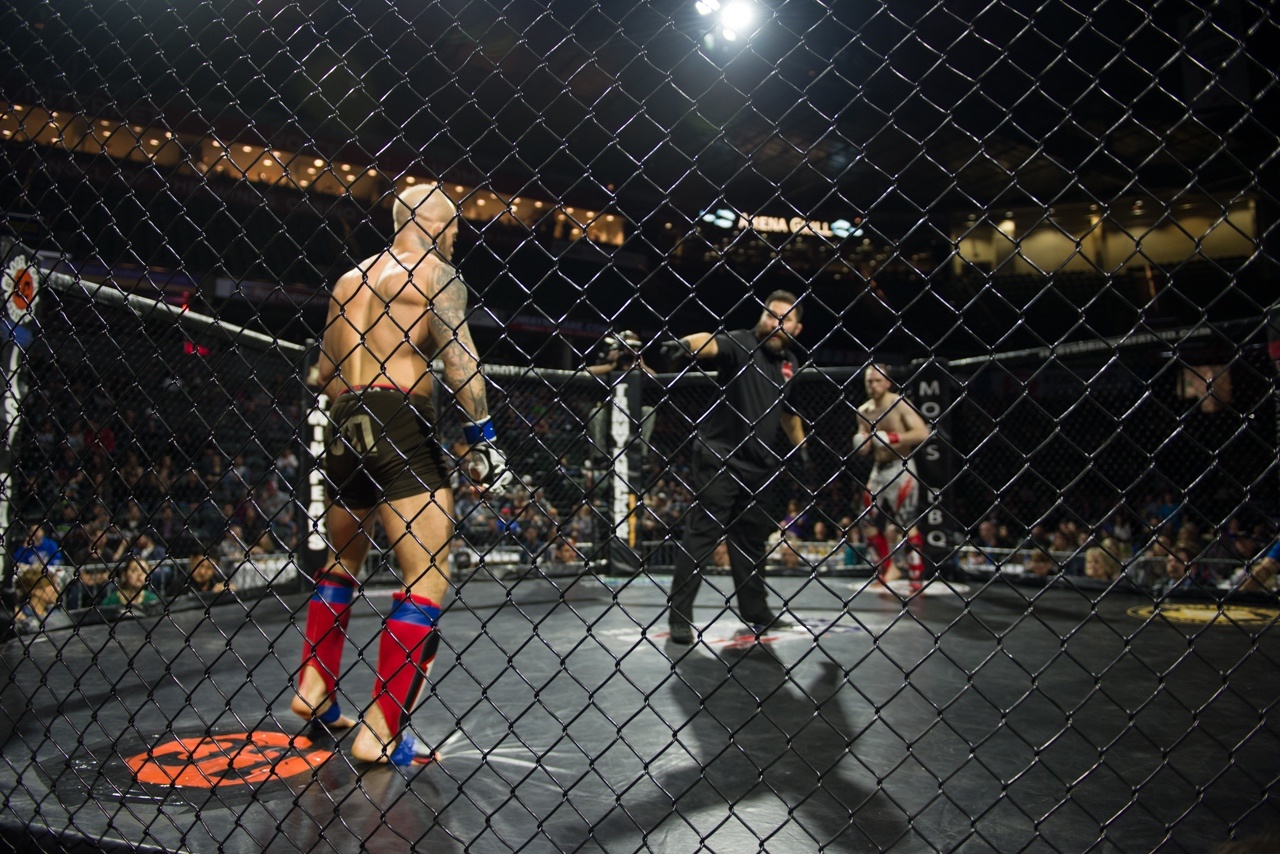
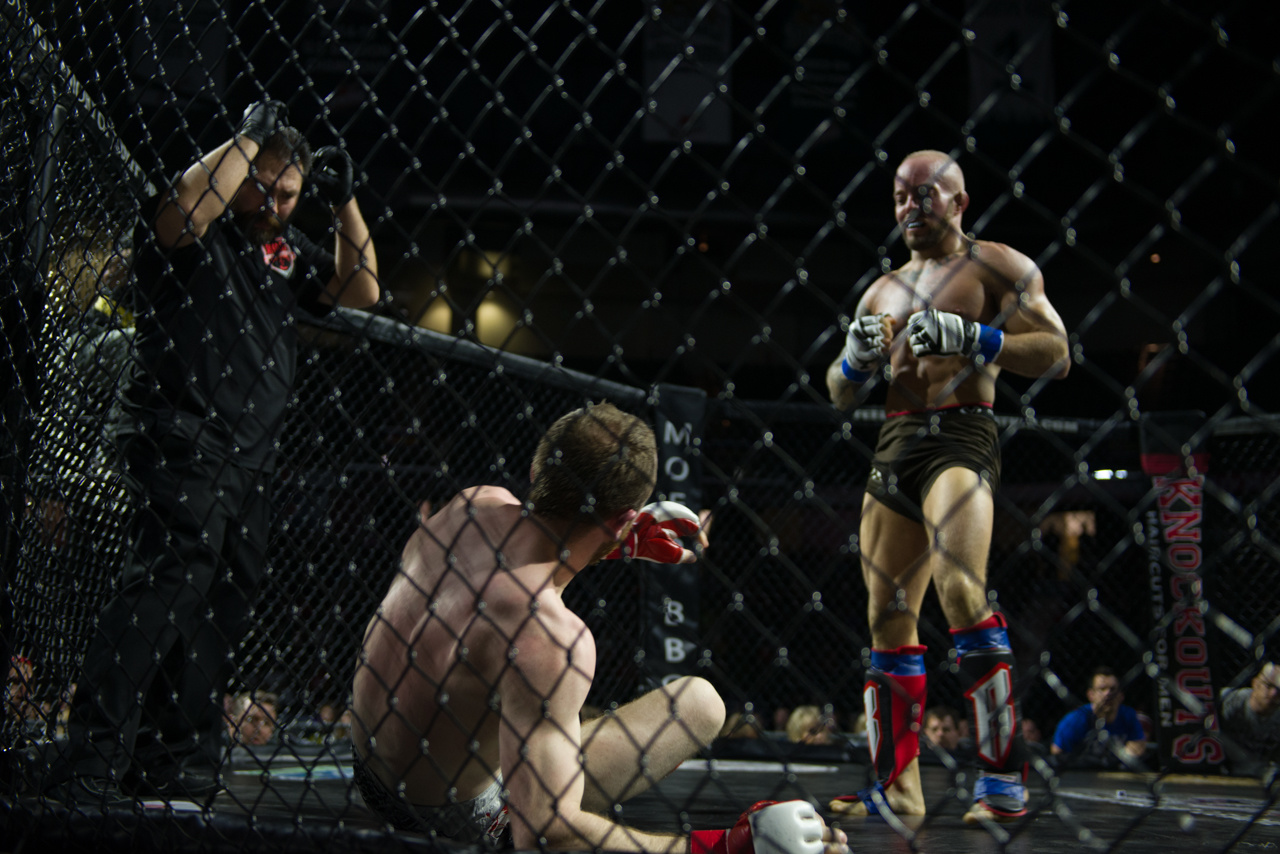
That is another key difference about the Sparta Combat League. Stories like Earwood’s matter to the company, and how staff and fighters are treated is a top priority. When I ask Cisneros what separates SCL from other promotional entities, I expect him to say something promoter-like – something about having the most intriguing matchups, the most brutal knockouts, or maybe something about groundbreaking production value. Instead, Cisneros focuses on what many promoters too commonly overlook.
“One-hundred percent [the difference] is the relationship that we have with our fighters. Whether you’re a 0-4 fighter or a 10-0 fighter, we treat you exactly the same. I make it a point to shake every fighter’s hand, as many as I can on the card,” says Cisneros. “My goal has always been this: Let’s treat the fighters all the same, whether you sell 300 tickets or you sell 10 tickets. They all are piece of the puzzle. We’re all a team. We understand that without the fighters, the fans and the sponsors, SCL doesn’t exist.”
I will say that there was an overwhelming sense of camaraderie between the fighters backstage, and it was one of the first times I felt that the purpose of the fight went beyond winning or losing. Instead, fighters fought for higher principles, such as representing a family member who endured a similar hardship of those being honored that night (a common request made to Sparta), and what really seemed to matter was just that they be given adequate stage to do so. For Cisneros, that dedication to fighters is not only out of professional obligation; fighting is a personal matter as well.
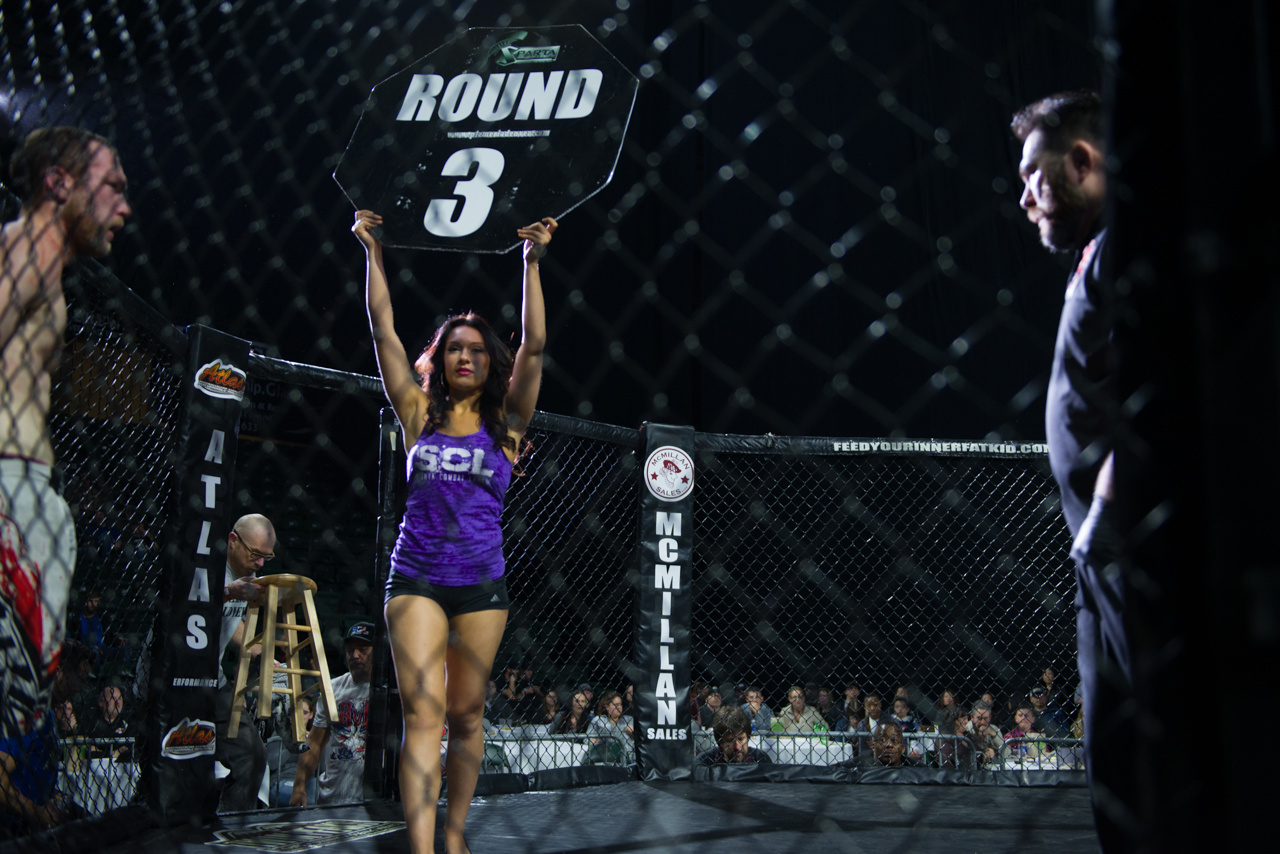
During his youth, Cisneros competed in the amateur boxing ranks and the practice helped him deal with matters in the home. His father was a Vietnam veteran father suffering from PTSD, and early in life his mother was diagnosed with a brain tumor, later undergoing surgery that drastically changed the family dynamics.
“[The surgery] changed who she was. I don’t mean this in a harsh way, but the mom I knew had died and the new mom woke up. It made her a manic depressant, just really rough behavior and sometimes she would disappear. It made it very tough. It wasn’t an easy childhood by any means,” says Cisneros. “They just didn’t have the resources that they needed, the help they needed. [My father] was a member of the 173rd Airborne in Vietnam and he would never talk about the war unless he was drinking, and when he did, he would talk about it in such a horrific and gruesome way, that as a young boy, I didn’t understand those things. But I can remember him having nightmares and just being like ‘Man, what’s going on here?’“
The experience embedded a mission that Cisneros carried well into adulthood, and is in large part what motivates the philanthropic approach of SCL. He found early in life that he also had an aptitude for business, partnering with a local baseball trading card store to sell merchandise to his 5th grade classmates, and later running an under-the-table pop and candy business in middle school. At 18, Cisneros launched a wholesaling company for nutritional supplements, and later created his own products under his brand Spartan Labs. Originally, Cisneros entered into fight promotion to use it as a launching pad for the nutritional merchandise, but with all the good that has come out of SCL, he’s now more fully dedicated to the fight promotion, clocking in 16-18 hours workdays between the two ventures.
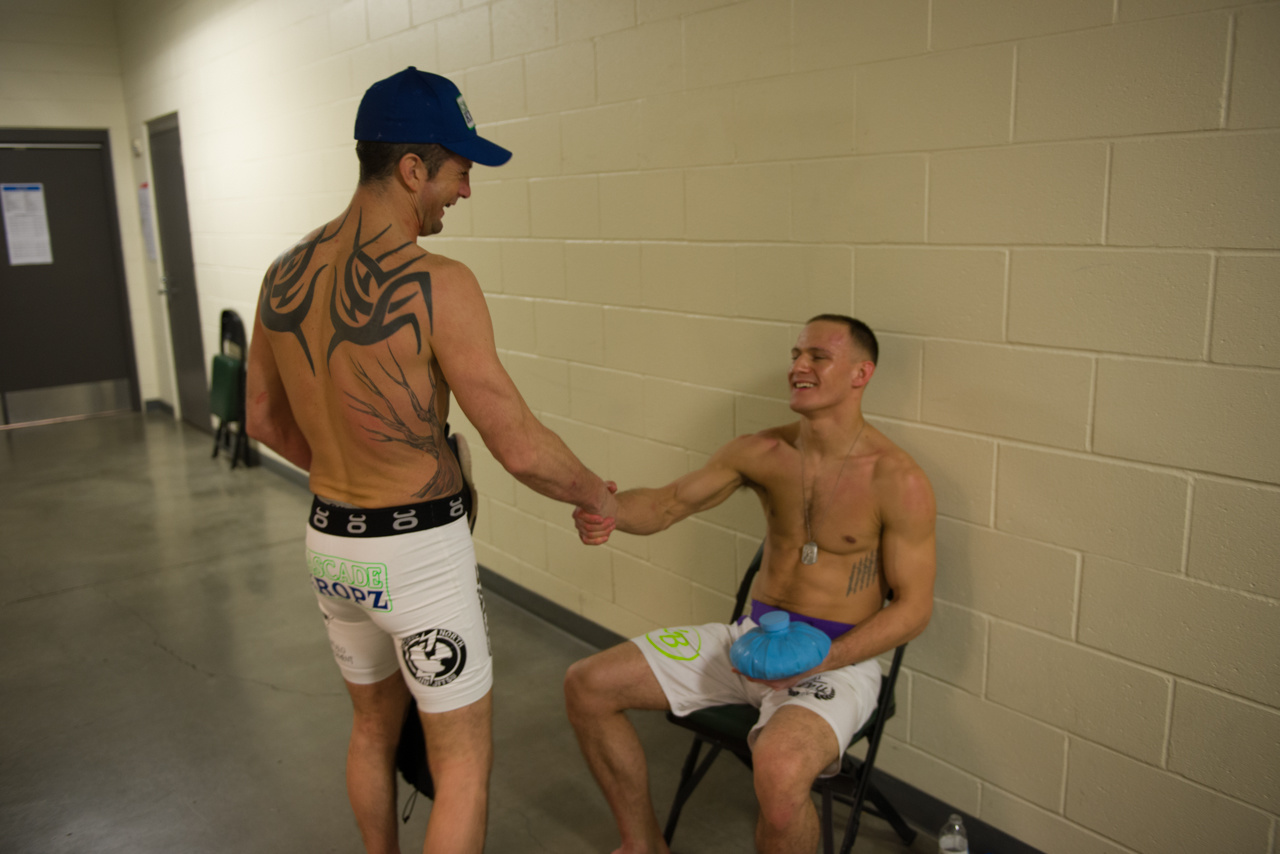
Fighters Taylor Roberts and Alan Gutierrez shake hands after their three-round bout. Though Roberts lost via KO in the first round, the two were friendly for the remainder of the night.
According to Cisneros, the brand is growing with each event. The attendance at AVM doubled from last year, and the donation amount raised for the veterans was roughly four times the amount the year previous. It’s also reaching national recognition as the company is set to co-promote an event with the World Series of Fighting that’s being broadcasted on the NBC Sports network this Saturday. In fact, the event may not only be a sign of evolution for Sparta, but for MMA in general.
As most fight fans already know, the promotional structure between MMA and other fighting sports is different. Take boxing as an example. In boxing, contenders are ranked by a number of sanctioning bodies and contracted by a variety of fight promoters. Therefore, it is not uncommon for two fighters from different promotional banners to meet together in the ring. MMA, on the other hand, is separated by its promotional distinctions. UFC fighters don’t fight Bellator fighters; WSOF doesn’t face off against ONE FC, and seldom do two companies promoting the same format of fighting join together for a show. However, Cisneros believes it only matter of time for co-promoting to become a trend in the sport.
“I think that UFC has been on top for so long and it was only a matter of time before other promotions would see the power in joining forces, as opposed to trying to do it solo,” says Cisneros. “The sport is evolving on all levels. We are now seeing for the first time ever, 18-year-old kids that have been trained in mixed-martial-arts for 8+ years, as opposed to the guys that were ex-wrestlers, ex-boxers, or ex-Muay Thai fighters, converted to mixed-martial-artists. So the sport is evolving because we’re seeing the true mixed martial artists being bred now, and that is changing the sport as well. There’s too much talent out there for just three promotions to have it all, so you’re gonna see a lot more co-promoting in the future.”
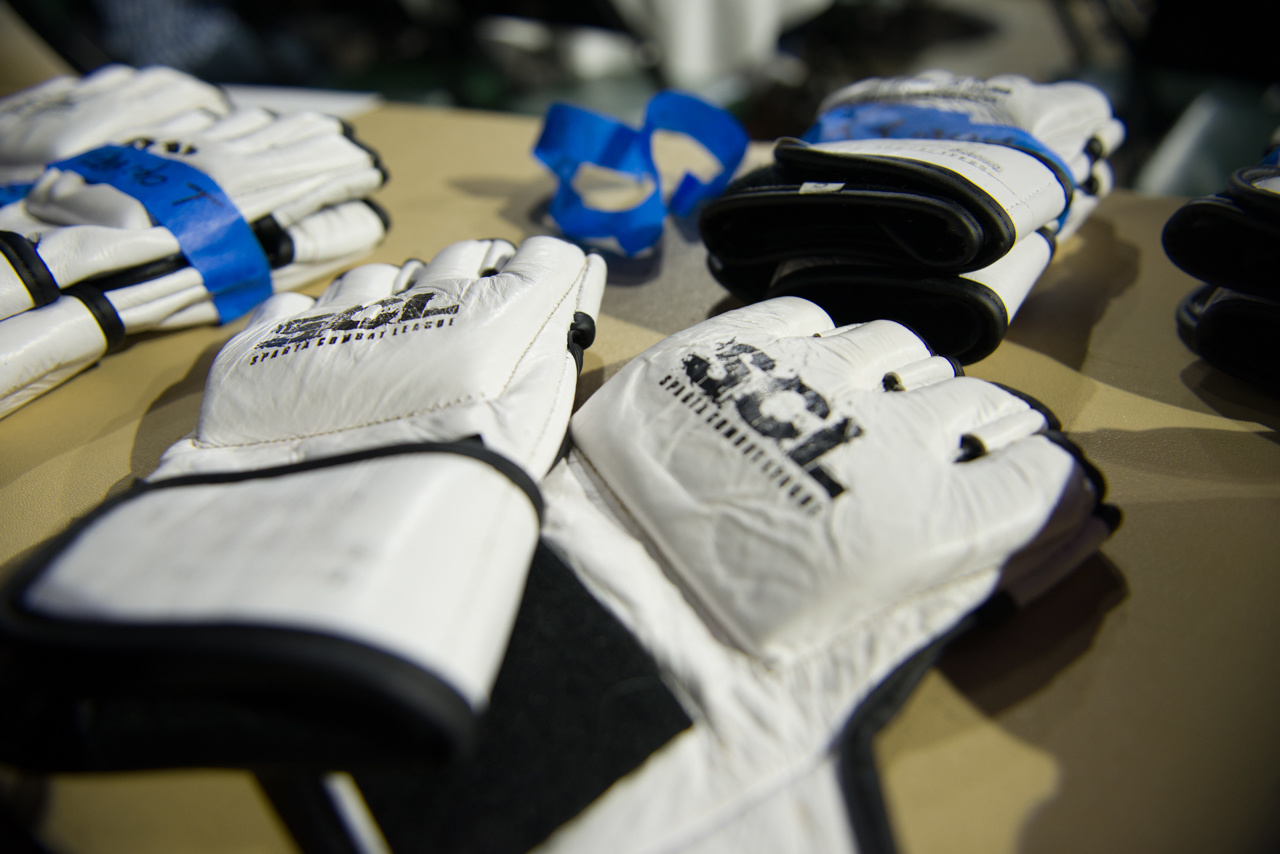
Regardless if Cisnero’s prediction proves correct, what is true is that the Sparta Combat League is an attempt at evolving the face of fight promotions, and it is undeniable that the company has changed both the lives and the perceptions of people who sometimes have no relation to the sport of combat fighting. That alone is a reason enough to hope the company makes it to the higher echelons of the fight game, but like the fighters competing in their fights, it also feels as though for SCL, that is a secondary objective.
“What we’re finding is a lot of families are very humbled and sometimes a little bit embarrassed to come out and ask for help. I grew up pretty poor, and so I know what it’s like,” says Cisneros. “So I want to make a difference in these people’s lives, I want to let them know that they’re not the only ones that have gone through a hard time and they don’t have to go through it alone. There’s a community willing to help.”
Find out more about Sparta here.



